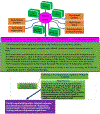Hypothesizing That Pediatric Autoimmune Neuropsychiatric Associated Streptococcal (PANDAS) Causes Rapid Onset of Reward Deficiency Syndrome (RDS) Behaviors and May Require Induction of "Dopamine Homeostasis"
- PMID: 36407790
- PMCID: PMC9670240
- DOI: 10.4236/oji.2022.123004
Hypothesizing That Pediatric Autoimmune Neuropsychiatric Associated Streptococcal (PANDAS) Causes Rapid Onset of Reward Deficiency Syndrome (RDS) Behaviors and May Require Induction of "Dopamine Homeostasis"
Abstract
Pediatric autoimmune neuropsychiatric disorders associated with group A streptococcal infections (PANDAS) is a concept that is used to characterize a subset of children with neuropsychiatric symptoms, tic disorders, or obsessive-compulsive disorder (OCD), whose symptoms are exacerbated by group A streptococcal (GAS) infection. PANDAS has been known to cause a sudden onset of reward deficiency syndrome (RDS). RDS includes multiple disorders that are characterized by dopaminergic signaling dysfunction in the brain reward cascade (BRC), which may result in addiction, depression, avoidant behaviors, anxiety, tic disorders, and/or OCD. According to research by Blum et al., the dopamine receptor D2 (DRD2) gene polymorphisms are important prevalent genetic determinants of RDS. The literature demonstrates that infections like Borrelia and Lyme, as well as other infections like group A beta-hemolytic streptococcal (GABHS), can cause an autoimmune reaction and associated antibodies target dopaminergic loci in the mesolimbic region of the brain, which interferes with brain function and potentially causes RDS-like symptoms/behaviors. The treatment of PANDAS remains controversial, especially since there have been limited efficacy studies to date. We propose an innovative potential treatment for PANDAS based on previous clinical trials using a pro-dopamine regulator known as KB220 variants. Our ongoing research suggests that achieving "dopamine homeostasis" by precision-guided DNA testing and pro-dopamine modulation could result in improved therapeutic outcomes.
Keywords: Borrelia; CANS; Dopamine Homeostasis; Group A Beta-Hemolytic Streptococcal (GABHS); Lyme; Molecular Mimicry; PANDAS; Pro-Dopamine Regulation; Reward Deficiency Syndrome.
Conflict of interest statement
Conflicts of Interest The authors declare no conflicts of interest regarding the publication of this paper.
Figures
References
-
- Swedo SE, Leonard HL, Garvey M, Mittleman B, Allen AJ, Perlmutter S, Lougee L, Dow S, Zamkoff J and Dubbert BK (1998) Pediatric Autoimmune Neuropsychiatric Disorders Associated with Streptococcal Infections: Clinical Description of the First 50 Cases. American Journal of Psychiatry, 155, 264–271. 10.1176/ajp.155.2.264 - DOI - PubMed
-
- Zhang R, Manza P, Tomasi D, Kim SW, Shokri-Kojori E, Demiral SB, Kroll DS, Feldman DE, McPherson KL, Biesecker CL, Wang GJ and Volkow ND (2021) Dopamine D1 and D2 Receptors Are Distinctly Associated with Rest-Activity Rhythms and Drug Reward. Journal of Clinical Investigation, 131, e149722. 10.1172/JCI149722 - DOI - PMC - PubMed
Grants and funding
LinkOut - more resources
Full Text Sources

